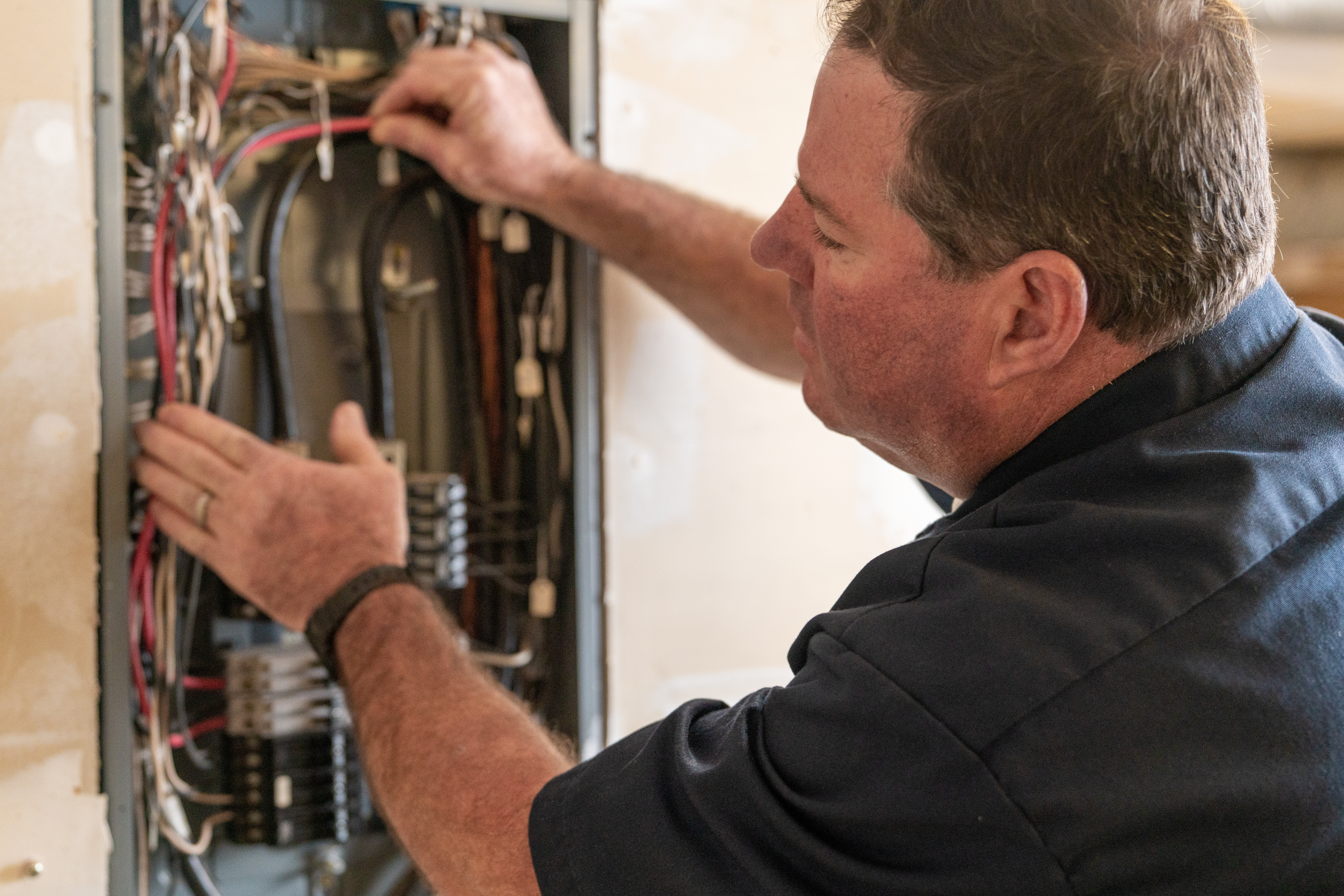
Replacing your electrical panel enhances system reliability and supports modern energy needs. Learn average electrical box replacement costs in New York City.
Grounding an outlet costs an average of $200, though prices can run between $100 and $300. Labor is the bulk of this cost, but electrical work should remain with the pros.


Grounding an outlet costs $5 to $22 for a 3-prong outlet, $7 to $25 for each GFCI outlet, and $25 to $50 for each smart outlet.
To ground the outlets in an older home, you'll need to install a ground wire, which costs $6 to $8 per foot and $130 to $170 for each connection.
Budget for related updates, such as grounding an electrical panel for $500 to $4,500 or replacing a fuse box for up to $2,000.
Labor costs $50 to $100 per hour, and the final cost depends on the electrician, the type of project, the location, and the amount of necessary work.
The cost to ground outlet is $200 on average, but you can expect to pay between $100 and $300 for this essential service. Your total cost depends on several factors, including the number and type of outlets, the need for rewiring or repair, and whether the electrician must open the walls for the service. Let’s review how to budget for the cost of grounding outlets in your home.
The total bill for grounding outlets in your home depends on several factors, including the number, type, placement, and more.
| Cost Factor | Average Cost |
|---|---|
| Materials | $5–$25 per outlet |
| Moving an outlet | $25–$300 |
| Adding an outlet | $100–$185 |
| Adding a ground wire | $6–$8 per foot; $130–$170 per connection |
| Rewiring or replacing an electric panel | $500–$4,500 |
| Opening walls | $200+ |
| Labor costs | $50–$100 per hour |
| Type of electrician | $40–$55 per hour for an apprentice or journeyperson; $100 per hour for a master |
| Minimum fee | $25–$75 |
Electricians typically charge between $50 to $100 per hour for labor—but the time it takes to ground an outlet can vary. Most of the factors that influence the cost of grounding an outlet relate to the scope of the job.
If you need to ground multiple outlets in your home at the same time, you’re in luck. The cost per outlet is lower when professional electricians have to ground several during the same service. Save money on this essential service by bundling multiple outlet-groundings into the same visit from your local electrician.
At a minimum, most grounding jobs involve replacing the outlet, and there are a lot of different varieties. Inexpensive three-prong outlets typically cost between $5 to $15 each, but something like a ground fault circuit interrupter receptacle (GFCI outlet) will cost $7 to $25 per outlet.
| Outlet Type | Average Cost |
|---|---|
| 3-Prong 120V | $5–$22 each |
| 220V, 240V, and 250V | $10–$20 each |
| GFCI | $7–$25 each |
| Smart | $25–$50 each |
Moving or installing a new outlet isn’t as simple as replacing an outlet, so there will be an additional charge. Moving an outlet can cost between $25 and $300, while adding a new outlet can cost between $100 and $185.
Many older homes have a two-wire system rather than a three-wire system. In this case, an electrician will have to add the third wire (aka the ground wire) to ground the outlet. Wiring generally costs from $6 to $8 per foot, and you can expect to pay between $130 to $170 per connection, though it will be more expensive in a larger home and less expensive in a small apartment.
Not all electrical panels are grounded, and circuits can get damaged from previous power surges. Your electrician may need to rewire or replace your electrical panel. This job can cost anywhere from $500 to $4,500. Replacing a couple of circuits can cost even less, but rewiring your whole house can cost a lot more.
Some older homes still have fuse boxes instead of electrical panels. A single fuse may only cost between $100 to $200 to replace. If you need to replace your fuse box, it can cost up to $2,000. At this phase, many homeowners opt to upgrade to an electrical panel.
Wires aren’t always accessible. If your electrician needs to start opening up walls to rewire part of your home, that can increase costs by a couple hundred dollars or more.
Every room of your house has different electrical codes, and the requirements for outlets change depending on the location. For example, bathrooms must have GFCI outlets, which help protect people from electrocution. Though most modern homes are already up to code, homeowners with older homes may need to update their wiring.
On average, you’ll pay an electrician between $50 to $100 per hour for labor. Your specific pricing will vary based on the electrician, as well as several factors like the type of job, the length of the job, your location, and the amount of work involved.
Your final cost to ground an outlet will also depend on who you hire, as there are many types of electricians to choose from. The more experience, education, and expertise an electrician has, the more you’ll pay for their services. Electricians can be placed into three main tiers based on skill and experience: apprentice, journeyperson, and master. While the average cost to hire an apprentice or journey-level electrician is $40 to $55 per hour, that increases to hire a master at $100 per hour.
Regardless of how long the job takes, most electricians charge a minimum fee to cover expenses, such as travel time, gas, supplies, and more. This cost is usually reflected in a higher first hour rate, which can be anywhere from $25 to $75 more than the standard hourly rate.

Without the proper training, electrical repairs are dangerous. According to the National Fire Protection Association, fires involving electrical failures and malfunctions are the deadliest type of home fire in the United States. To protect your family, it’s important to hire a local electrician who is licensed and insured and will understand current codes and safety requirements. While they handle the tough stuff, you can spend your Saturday relaxing.
It’s no doubt that money spent on grounding your outlets is worth it. After all, your safety is priceless. However, there are still ways to cut down on the cost of electrical work. Here are some helpful tips.
Get multiple quotes before hiring an electrician to ensure you’re getting the best deal.
If possible, avoid getting electrical work done on holidays, weekends, or evenings. Schedule visits for regular business hours.
Clean and prepare the work area on your own, so the electrician can begin work right away.
Purchase your own devices rather than using ones supplied by your electrician, if possible.
Home is the most important place on earth, which is why Angi has helped more than 150 million homeowners transform their houses into homes they adore. To help homeowners with their next project, Angi provides readers with the most accurate cost data and upholds strict editorial standards. We extensively research project costs to develop the pricing data you see, so you can make the best decisions for you and your home. We rely on reputable sources, including the U.S. Bureau of Labor Statistics, academic journals, market studies, and interviews with industry experts—all to ensure our prices reflect real-world projects.
Want to help us improve our cost data? Send us a recent project quote to [email protected]. Quotes and personal information will not be shared publicly.
From average costs to expert advice, get all the answers you need to get your job done.

Replacing your electrical panel enhances system reliability and supports modern energy needs. Learn average electrical box replacement costs in New York City.

Rewiring a house in New York City can fix out-of-date wiring and provide electrical systems with modern capabilities, but owners must plan for the electrician's costs appropriately.

How much does it cost to add an electrical outlet in New York City? Explore typical price ranges, permitting needs, and what drives cost in NYC homes.

The electrical panel delivers all your electricity needs, but it might ruin your aesthetic. Here are the electrical panel location rules so you can choose the best spot.

When a three-way switch only works when one switch is on, the wiring or switch is often to blame. Find out how to diagnose and correct the problem.

Learn a new skill and find out how to wire a light switch (safely) in your own home. This is one project that’s sure to light up your day.